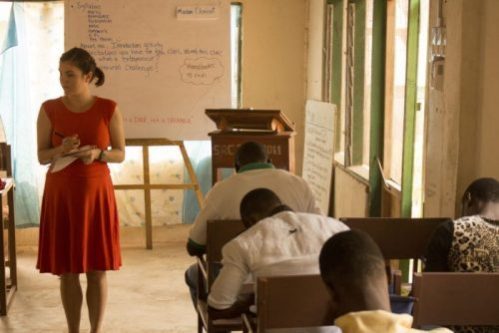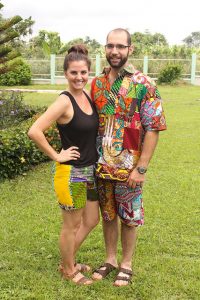
Nearly one year ago, Nick and I were saying goodbye to Ghana. I remember it vividly. The AgriCorps crew was bunked up in the Sleepy Hippo Hotel in Accra, a musty haven for foreigners where the beer was cold and company exotic. Nick and I were spoiled with our own room, complete with a private toilet, full shower, and AC while the others were piled six to a room next door; the perks of having just celebrated our first anniversary. The day was spent in preparation for the flight home. We weighed our bags, practiced the presentation we would give the AgriCorps Board, and scrambled to buy any last minute trinkets for our families. I remember taking Critter (our dog) on several walks around the block, giving him ample exercise before the long journey to America. I recall a sense of nostalgia wash over me as I tried to memorize the scene, hoping I wouldn’t forget it. The sticky heat on my skin, the cacophonic honking of taxis and upbeat music of bars, the women sweeping their storefronts with dried palm fronds, the men lazily chatting on corners. Oh, what a different world it was. . .
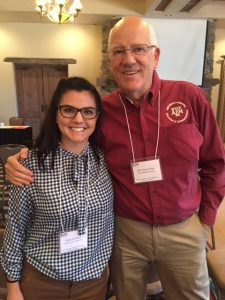
Today, my surroundings look much different. I now sit at my desk at Oregon State University, where I will spend the next two years earning a Ph.D. in Agricultural Education. I sit in a comfortable office chair, surrounded by a polished wooden “L” shaped desk. In front of me are two monitors displaying my Outlook inbox on the left and a journal article about cogenerative dialogues (don’t ask) on the right. The temperature is a comfortable 72 Degrees. A look out the window to my left shows a green landscape in front of the university library; students are languidly walking to and fro, enjoying the sunshine (a rarity in Corvallis). There are no street shops selling jolof rice, no women toting water on their heads, and no barefoot children yelling “Obroni! Obroni!”. How the landscape has changed.
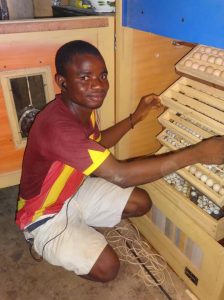
This past year has been a whirlwind of research papers, reading, teaching, coordinating, advising, and collaborating; a life much different than the lethargic pace of Domeabra, Ghana. However, when I think of my time in Ghana, I become sad. I miss our neighborhood children – Mome, Ama, Akwasi, Ohema, Elijah, and Jonita. I miss their smiling faces, their silly games, their helpful hands, their inquiring questions, and most of all, their love. Don’t worry though; you’ll be happy to know that I have heard from them several times. Mome calls me about once a month and when I hear her sweet voice, my heart fills with love and longing. They are all doing well. Thankfully, our good friend Bernard still passes through Domeabra and checks in on them for us. I don’t know how or when we’ll do it, but Nick and I plan on bringing Mome to the U.S. when she is older, to visit, go to school, anything.
You may be wondering at this point whether Nick or I made any difference at all during our time in Ghana. Did our presence cultivate change? Inspire young leaders? Help people? Well, we certainly didn’t end world hunger, or create a movie-worthy movement, but I do believe we catalyzed change in our students and communities. This is evident through our ongoing conversations with our former students from KITA. Over the past year, we have stayed in touch with many of them, especially the KITA 4-H club. They have kept up with what Nick and I started, hosting events that aim to teach youth about various agricultural practices. Several of our students have demonstrated entrepreneurial endeavors, from using recycled materials for container gardens to building an egg incubator using local fertilized eggs. Justice, my Creed speaking competition winner has continued to recite the Creed at various community events, and the Creed contest was even developed to a National 4-H public speaking competition. Adam, another former student, has left KITA to pursue other agricultural endeavors and has received two different internships throughout KITA to help build his knowledge base before starting his own operation back home in Togo. Christopher, the former 4-H president has also left KITA to pursue a more advanced degree in agriculture. Hearing about our students’ successes has brought great pride to my heart this past year; I only wish I could be there in person to congratulate them.
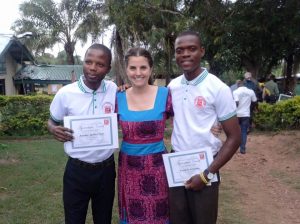
Aside from the successes of my students, perhaps the greatest change has occurred within. A year abroad has given me new perspectives about the world and the people in it. It’s a hard thing to explain but perhaps is best described as becoming world-wise (the title of author Richard Slimbach’s book about global learning). My experience in AgriCorps has made me world wise (or perhaps world wiser). My experience has shaped who I am, my identity, and has changed the way I look at the world. Every time I hear discussions about politics, see a man hard at work, smell fried onions, or walk into a grocery store, I think of Ghana. My views, opinions, and experiences are no longer confined to the borders of California or Oregon or the U.S. I now recognize that there is more to this world than viral videos, fast fashion, or people who want to be angry about something because it gives them purpose.
Although I have so much more to learn, I now can see beyond myself and my immediate surroundings. Every big headline, every major global event, every political shift makes me think not of my own life, but to the lives of the hundreds of Ghanaians who have made an impact on me. As I continue my journey through the doctoral program, I hope to continue to support AgriCorps in any way I can. Thank you for doing purposeful work and helping make the world a better place.
Haley Clement is a graduate of California State University at Chico. Before AgriCorps, she taught high school agriculture for five years in California. She is now working on her PhD in Agricultural Education at Oregon State University.


